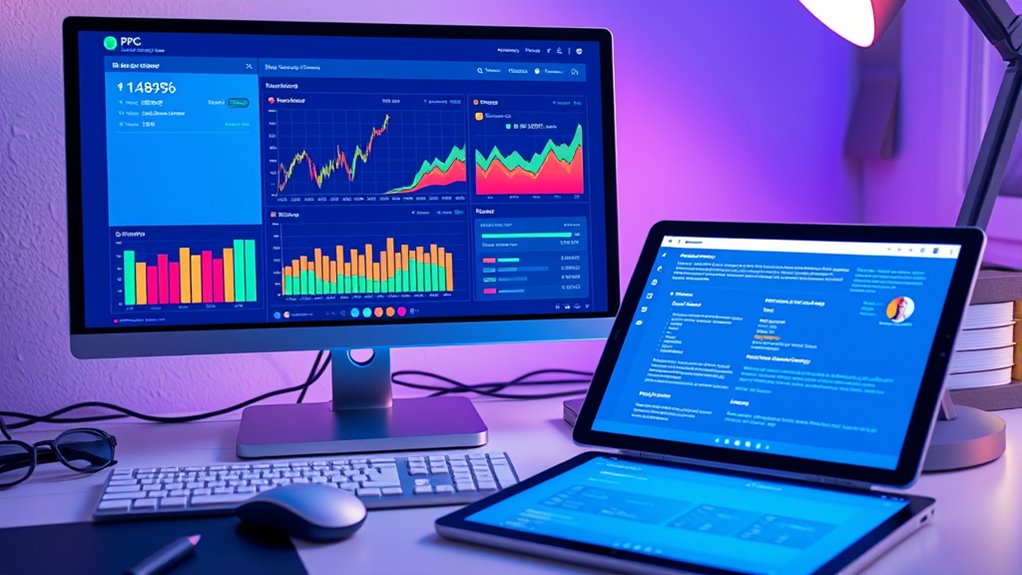Using scripts and AI in PPC management helps you automate routine tasks like keyword research, ad copy testing, and bid adjustments. This streamlines your workflow, reduces errors, and allows for faster campaign optimizations based on real-time data. AI-powered tools help you make smarter decisions with data-driven insights. By implementing these technologies, you can improve your campaign efficiency and ROI. Keep exploring to discover how these strategies can transform your PPC efforts.
Key Takeaways
- Automate routine PPC tasks like bid adjustments and ad copy testing to save time and reduce errors.
- Use AI-driven insights for real-time campaign optimization and performance monitoring.
- Leverage scripts to streamline keyword research and quickly implement data-based improvements.
- Incorporate machine learning for predictive analytics to refine targeting and maximize ROI.
- Maintain manual oversight and regularly review automation processes to ensure alignment with marketing goals.
Understanding the Role of Scripts and AI in PPC Management

Scripts and AI have become essential tools in PPC management because they automate routine tasks, saving you time and reducing human error. They assist with keyword research by analyzing large data sets quickly, helping you identify high-performing keywords more efficiently. When it comes to ad copywriting, AI can generate compelling ad texts tailored to your target audience, improving engagement. These tools enable you to refine your campaigns faster, ensuring your keywords are relevant and your ad copy resonates. Incorporating high refresh rates can further optimize performance by enabling faster updates and adjustments to your campaigns. Additionally, leveraging AI security measures helps protect your campaigns from potential vulnerabilities and malicious attacks. By integrating scripts and AI into your workflow, you gain more control over your PPC strategy, allowing you to focus on optimizing overall performance rather than getting bogged down in repetitive tasks. This synergy of automation and insight is transforming how you manage and improve your campaigns.
Automating Routine Tasks for Enhanced Efficiency

Automating routine tasks in PPC campaigns substantially boosts your efficiency by freeing up time and minimizing manual errors. You can set up scripts to streamline keyword research, quickly identifying high-performing keywords and pausing underperformers. This allows you to focus on strategic adjustments rather than tedious data collection. Additionally, automating ad copy testing helps you run multiple variations simultaneously, instantly identifying the most effective messaging. By automating these repetitive tasks, you reduce human error and ensure consistent campaign optimization. This frees you to concentrate on more complex aspects of campaign management, such as targeting strategies and budget allocation. Moreover, incorporating anime movies into your creative testing can inspire engaging ad content that resonates with diverse audiences. Overall, automation enhances your productivity and ensures your campaigns stay agile and competitive.
Leveraging AI for Data-Driven Optimization

Leveraging AI for data-driven optimization transforms how you manage PPC campaigns by enabling real-time insights and adaptive strategies. AI analyzes data from the ad auction, helping you identify which keywords and placements perform best. With this information, you can make precise bid adjustments that maximize ROI. Instead of relying on guesswork, AI continuously monitors campaign performance, detecting patterns and trends that influence ad success. This ongoing analysis ensures your strategies remain effective amidst market shifts, aligning with cyber defense principles of continuous learning and adaptation. Additionally, using performance metrics allows you to evaluate campaign success and identify areas for improvement. This allows you to react swiftly to market changes, ensuring your bids are competitive without overspending. By automating bid adjustments based on data, you optimize your campaigns efficiently, reduce wasted ad spend, and improve conversion rates. Incorporating machine learning techniques further enhances predictive capabilities, enabling even more precise bid strategies. Moreover, integrating predictive analytics can help forecast future trends and adjust your campaigns proactively. Ultimately, AI-driven optimization empowers you to make smarter decisions faster, keeping your PPC efforts ahead of the competition.
Practical Examples of PPC Automation in Action

One clear example of PPC automation in action is using bid management tools that automatically adjust your bids based on real-time performance data. This streamlines bid adjustments, ensuring you’re competitive without micromanaging every change. These tools analyze metrics like click-through rates and conversion data, optimizing bids to maximize ROI. Additionally, automation can facilitate ad copy testing by running multiple versions simultaneously and shifting budget toward the best performers. This speeds up the testing process and helps identify high-converting messaging more quickly. By automating bid adjustments and ad copy testing, you reduce manual effort, improve campaign efficiency, and respond faster to market dynamics. Incorporating performance metrics into your strategy can also serve as a creative analogy for customizing PPC campaigns to fit your specific goals, making your marketing efforts more tailored and effective. These practical applications demonstrate how automation can make your PPC campaigns smarter and more responsive.
Best Practices for Implementing Automation Safely and Effectively

Implementing automation in your PPC campaigns can substantially boost efficiency, but it requires careful planning to avoid pitfalls. Always maintain manual oversight to ensure automation aligns with your broader marketing goals and responds appropriately to unexpected issues. Regularly review automated actions and data to verify accuracy and performance. Prioritize ethical considerations, such as transparency in how AI makes decisions and respecting user privacy. Avoid relying solely on automation; human judgment must guide strategic adjustments. Start small with test campaigns, analyze results, and expand gradually. Document your processes and set clear KPIs to measure success. This balanced approach ensures automation enhances your campaigns without sacrificing control or ethical standards. Incorporating best practices for airless paint sprayers can serve as a helpful analogy for managing automation effectively, emphasizing thorough preparation and ongoing oversight to achieve optimal results. Additionally, understanding the fundamentals of natural language processing can help you better interpret AI-driven insights and avoid missteps. Moreover, staying informed about advancements in AI ethics and regulation can ensure your automation practices remain compliant and socially responsible. Being aware of industry-specific nuances, such as the regulations governing digital advertising, can further safeguard your campaigns and maintain trust with your audience.
Frequently Asked Questions
How Do Scripts Integrate With Existing PPC Platforms?
You can easily integrate scripts with your PPC platforms through platform integration features that support scripting languages like JavaScript or Python. These scripts automate tasks, optimize bids, or pause keywords based on real-time data. Simply access your platform’s scripting interface, upload or write your scripts, and set triggers or schedules. This seamless integration helps you manage campaigns more efficiently and frees up time for strategic planning.
What Are Common Pitfalls When Automating PPC Campaigns?
When automating PPC campaigns, you might face pitfalls like overspending your ad budget or mismanaging keyword targeting. Automation can lead to rapid budget depletion if you don’t set proper limits, and poor keyword choices can reduce ad relevance, lowering click-through rates. To avoid these issues, monitor your campaigns regularly, refine your keyword list, and set clear budget caps to guarantee your automation works effectively without draining resources.
Can AI Predict Long-Term Trends in Ad Performance?
Imagine you’re running a campaign and want to predict future ad performance. AI can assist through trend analysis and predictive modeling, giving you insights into potential long-term shifts. For instance, a retail brand used AI to forecast seasonal demand, optimizing ad spend accordingly. While AI can’t guarantee precise predictions, it helps you identify patterns and make informed decisions, making your campaign more adaptable to future changes.
How to Ensure Automation Complies With Advertising Policies?
You need to prioritize ad policy adherence and compliance monitoring to guarantee automation stays within guidelines. Regularly review platform policies, set up automated alerts for policy violations, and use tools that track compliance in real-time. By staying proactive, you can catch issues early, avoid penalties, and maintain a trustworthy ad account. This approach helps your automated campaigns run smoothly without risking non-compliance, ensuring long-term success.
What Skills Are Needed to Develop PPC Automation Scripts?
You’d need a superhero’s skill set to develop PPC automation scripts! Mastering programming languages like Python or JavaScript is essential, along with understanding API integrations. You also need sharp skills in keyword optimization and data analysis to create effective scripts that boost campaign performance. Plus, a knack for troubleshooting and adaptability keeps your automation running smoothly. With these skills, you’ll turn complex tasks into effortless, turbocharged campaigns!
Conclusion
By embracing scripts and AI, you’ll save time and boost your campaign performance. Automating routine tasks frees you up to focus on strategy, while data-driven insights help optimize your ads effectively. Just remember, don’t put all your eggs in one basket—test and refine your automation carefully. With the right approach, you’ll turn PPC management from a headache into a walk in the park. Stay proactive and keep experimenting!










